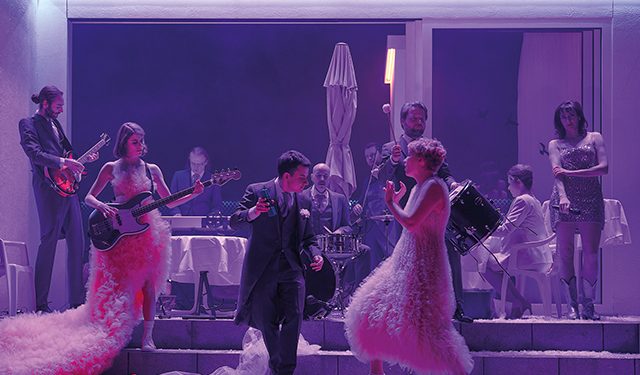Love, freedom, heroic sacrifice and revolt have been the major topics of the biblical stories that dominate our cultural memory. The story of Samson and Delilah is no exception. In view of contemporary feminist movements, the character of Delilah offers more room for interpretation than the traditional, cliche-like reading of her part as a prostitute and traitor. In her interpretation of Delilah at the Staatsoper Unter den Linden, Georgian opera singer Anita Rachvelishvili personifies with incredible power and verve a femme-fatale; a woman that rebels against the patriarchal orders imposed on her by society for better or for worse. Although the stage settings and the costumes refer to and revive the biblical atmosphere, the characters are astonishingly contemporary with their inner struggles, doubts and passions. The mighty yet vulnerable hero Sasmson falls in love with the irresistible Delilah, whose presence is magnetic, with Anita Rachvelishvili revealing a wide palette of feelings from seductive, arousing and sensual to cunningly ruthless, conspiring and intriguing.
Samson et Delilah is all about brutal rebellion, with clashing characters and emotions on edge, with the Israeli people‘s destiny at stake in their incessant struggle for freedom. A nation fighting for its mere existence, defending children and women threatened by merciless conquerors who stop at nothing during their murderous rampages. Delilah is aware of this yet she distances herself from identifying with the opposing parties. In the fight between the Israelis and the Philistines in the current production by Damian Szifron, she stands for herself, driven by motives of her own. The fire she symbolically sets is not that of homely coziness, but the devastating flame of love that would turn into hate, revolt and unrest, a fire feeding darker impulses behind human behaviors and emotions. Towards the end, when the blinded Samson, remarkably performed by Brian Jagde, recovers his power, he has evolved to a better self, a hero who has known love and defeat and who gives his life for the sake of others in rage and as revenge.
The final showdown, although less spectacularly staged as one would hope for, shows a stark rupture. The contrast itself between the Philistines with their ludicrous ritual dances and orgiastic festivities, as opposed to the bareness and sufferings of the Israelites, creates a deep opposition all wonderfully rendered in Camille Saint-Saëns timeless music. The composer himself considered this opera as one of his main works. It has a complicated history, since its biblical story has presumably been one of the main obstacles in its staging at the Paris Opera House. Camille Saint-Saëns was a true admirer of Richard Wagner, whose operas, staged in Paris with varying success, influenced the composer to a certain extent.
Samson et Delilah was finally staged at the Paris Opera House in 1892 and thereafter became part of the opera repertoire of leading European Opera Houses.

Anton Chechov’s timeless classics never lose their acute touch. This remains true with Ivanov, one of Chechov’s earlier works staged at the Berliner Ensemble by Yana Ross. The whole production has only profited from the settings moved by the director from the original provincial Russia into a tennis club of a small German provincial town. Because, as always with Chechov’s characters, times and settings change but the main characters remain, facing their challenges and doubts. And although influencers, tennis club settings, lengthy passages about the brutalities of cooking animals alive in boiling water never came across in Chechov’s original text the spirit of the play remained unchanged between the lines, in the pauses, in the desperate movement. The main characters, confined within the walls of the tennis club, appeared forlorn and hopeless in their aspiration to achieve something in their lives, e.g. to escape from the insignificant provincial existence to big cities like Paris or elsewhere; to become wealthy and famous.
All of the club members appeared egomaniac, disillusioned, plagued by self-doubt, self-obsessed and disillusioned. A snapshot of a society on the verge of a crisis that it neither understands nor has the ability to prevent from happening. Like in 1887, when the play was written, Russian society experienced severe transformations that culminated in the brutalities of the Communist revolution so now contemporary society finds itself in the epoch of economic instabilities, wars and crises of all sorts that it is incapable of grasping or adequately dealing with. Although the protagonists of the play belong to the so called well-off upper middle class club, they’re too bourgeois to break with the conventions for the sake of their passions or emotions, too cowardly to be sincere with each other and too petty for big feelings. Tennis playing stands as a metaphor for performance and failure, playing as acting on stage and aggressive ball-shooting in the fits of rage. However the protagonists even the more passionate ones are so trivial that are no good for truly deep emotions. Pettiness, triviality, spiritual apathy and indifference have become the plague of contemporary affluent societies the way these have been characteristic for the societies when Chechov wrote his play. A good example is a game that one of the female protagonists suggests for the guests assembled for her birthday party. The game is about violence in the language we use. Each one is requested to pronounce a word that triggers her as violent so that for the duration of the eve, this word be banished from use for the sake of respect and caring for one another.
But is contemporary society still capable of being emphatic to the feelings and sufferings of the other? Emotional callousness, indifference to the agonies of the fellow creatures and estrangement are the main features characteristic of Chechov’s characters who, in Yana Ross’s contemporary interpretation, are as poignant, challenging and monstrous as ever. The same way human beings will never understand the agonies of a lobster thrown alive into a boiling cooking pot so will neither of us ever be able to grasp the sufferings of others. Human understanding of the sufferings of their fellows is very limited.
By Lily Fürstenow-Khositashvili














